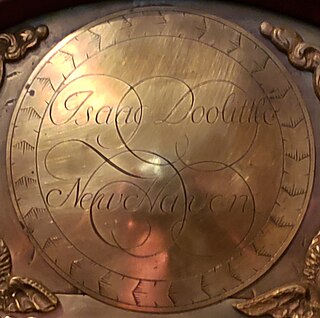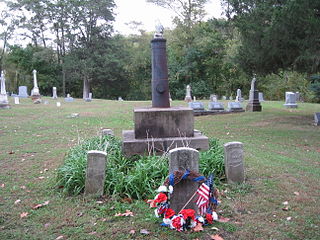 W
WAbraham Baldwin was an American minister, Patriot, politician, and Founding Father. Born and raised in Connecticut, he was a 1772 graduate of Yale College. After the Revolutionary War, Baldwin became a lawyer. He moved to the U.S. state of Georgia in the mid-1780s and founded the University of Georgia. Baldwin was a member of Society of the Cincinnati
 W
WJoel Barlow was an American poet and diplomat, and French politician. In politics, he supported the French Revolution and was an ardent Jeffersonian republican.
 W
WDaniel Bissell was a soldier and spy for the Continental Army during the American Revolutionary War. Bissell joined the British Army for 13 months and passed intelligence information to the Continental Army. For his efforts, Bissell was awarded the Badge of Military Merit by General George Washington.
 W
WElijah Boardman was an American politician who served as a senator from Connecticut. Born to a noted and politically connected Connecticut family, he served in the Connecticut militia before becoming a noted merchant and businessman. Becoming involved in property and land ownership in Connecticut and Ohio, he founded the towns of Boardman and Medina in Ohio. His involvement in politics also increased, and he gradually rose through the ranks of the local, and then national government, being elected by the Connecticut legislature to the United States Senate. He served as Senator from Connecticut until his death in Ohio.
 W
WDr. Isaac Bronson was a surgeon during the American Revolutionary War. He was later a successful banker and land speculator and is credited with co-founding the New York Life Insurance and Trust Company and Ohio Life Insurance and Trust Company. Bronson was a member of the Society of the Cincinnati.
 W
WWilliam Brown (1759–1808) was a soldier for the Continental Army during the American Revolutionary War. He was born in Stamford and enlisted in the 5th Connecticut Regiment as a corporal on 23 May 1775, and re-enlisted as a private on 9 April 1777, for the duration of the war in the 8th Connecticut Regiment. He was promoted to corporal on 8 May 1779, and to sergeant on 1 August 1780, transferring with the consolidation of units to the 5th Connecticut Regiment on 1 January 1781, and to the 2nd Connecticut Regiment on 1 January 1783. He was awarded the Badge of Military Merit, one of only three people to be awarded the medal that later became the Purple Heart. No record of his citation has been uncovered, but it is believed that he participated in the assault on Redoubt No. 10 during the siege of Yorktown.
 W
WDavid Bushnell , of Westbrook, Connecticut, was an American inventor, a patriot, one of the first American combat engineers, a teacher, and a medical doctor.
 W
WEpaphroditus Champion was a late-eighteenth-century and early-nineteenth-century war veteran, politician and land owner from Connecticut. He served as a U.S. Representative from Connecticut.
 W
WMason Fitch Cogswell was a United States physician.
 W
WIsaac Doolittle was an early American clockmaker, inventor, engineer, manufacturer, militia officer, entrepreneur, printer, politician, and brass, iron, and silver artisan. Doolittle was a watchmaker and clockmaker, known for making and selling at his shop in New Haven, Connecticut one of the first brass wheel hall clocks in America, where he also crafted and sold scientific instruments, and is regarded as "the first native practitioner" of silversmithing in the Connecticut Colony. He was also an engraver and printer of both legal forms and currency, and became the first American to design, manufacture, and sell a printing press in 1769. Somewhat late in life, he became a successful self-educated bell-foundryman, learning the difficult craft of casting large metal bells.
 W
WWilliam Eaton was a United States Army officer and the diplomatic officer Consul General to Tunis (1797–1803). He played an important diplomatic and military role in the First Barbary War between the United States and Tripoli (1801–1805). He led the first foreign United States military victory at the Battle of Derne by capturing the Tripoli subject city of Derne in support of the restoration of the pasha, Hamet Caramelli. William Eaton also gave testimony at the treason trial of former Vice President Aaron Burr. He served one term in the General Court of Massachusetts. Eaton died on June 1, 1811, at the age of forty-seven.
 W
WOliver Ellsworth was an American lawyer, judge, politician, and diplomat. He was a framer of the United States Constitution, a United States Senator from Connecticut, and the third chief justice of the United States. Additionally, Ellsworth received 11 electoral votes in the 1796 presidential election.
 W
WRoger Enos was a colonial Vermont political and military leader during the American Revolution. In 1775, he took part in Benedict Arnold's expedition to Quebec, and he later commanded the Vermont Militia as a major general.
 W
WWilliam Goddard was an early American patriot, publisher, printer and postal inspector. He was born in New London, Connecticut and lived through the American Revolution era. He was a staunch anti-imperialist and an ardent defender of the fundamental American ideals of freedom of the press and speech. Goddard served as an apprentice printer under James Parker and in 1762 became an early American publisher who eventually established four newspapers during the American colonial period. For a short time he was also a postmaster of Providence, Rhode Island. Later his newspaper partnership with Benjamin Franklin in Philadelphia would play an important role in the development of Franklin's ideas for a postal system in the soon to be united colonies. Goddard's association with Franklin while he was serving as the Postmaster in Philadelphia played an important role when they were introducing many of the reforms and improvements needed in the colonial postal system currently in use.
 W
WNathan Hale was an American Patriot, soldier and spy for the Continental Army during the American Revolutionary War. He volunteered for an intelligence-gathering mission in New York City but was captured by the British and executed. Hale has long been considered an American hero and, in 1985, he was officially designated the state hero of Connecticut.
 W
WBenjamin Hanks is generally accepted to be the first person to make bronze cannons and church bells in the United States. He was a goldsmith, instrument maker, clockmaker, bellfounder, and foundry owner.
 W
WNero Hawley was an African-American soldier who was born into slavery in North Stratford, Connecticut, and later earned his freedom after enlisting in the Continental Army in place of his owner, Daniel Hawley, on April 20, 1777, during the American Revolution. His heroic life is featured in the 1976 book From Valley Forge to Freedom, which also notes other areas of present-day Trumbull, Connecticut associated with Hawley.
 W
WJared Ingersoll gained notoriety in Connecticut as agent for the Stamp Act of 1765.
 W
WEphraim Kirby was a Revolutionary War soldier, published the first volume of law reports in the United States, was the first General High Priest of the Royal Arch Masons of the United States, and was the first judge of the Superior Court of the Mississippi Territory.
 W
WEzra Lee was an American colonial soldier, best known for commanding and operating the one-man Turtle submarine.
 W
WJoseph Plumb Martin was a soldier in the Continental Army and Connecticut Militia during the American Revolutionary War, holding the rank of private for most of the war. His published narrative of his experiences, re-discovered in the 1950s, has become a valuable resource for historians in understanding the conditions of a common soldier of that era, as well as the battles in which Martin participated.
 W
WCato Mead is the only known Black Patriot buried west of the Mississippi River. Mead is buried in or near Montrose Cemetery in Montrose, Iowa.
 W
WEleazer Oswald was born at Falmouth, Cornwall, in England, but moved to British America as a young man. He became apprenticed to a printer, John Holt of Williamsburg, Virginia, and married the man's daughter, Elizabeth Holt. In the American Revolutionary War he immediately threw in his lot with the American colonists. He participated in Benedict Arnold's expedition to Quebec in 1775 and was captured. After a prisoner exchange, he was promoted to lieutenant colonel of artillery in January 1777. He performed notable service during the Danbury Raid in Connecticut during April 1777. At the Battle of Monmouth in June 1778 he distinguished himself while playing a major role in the engagement.
 W
WJedediah Peck was an American farmer, surveyor, Revolutionary War soldier, and New York State legislator described as a father of the common school system of the State of New York. He was a man of limited education and had no gift as a debater or speaker, but he was a skillful organizer.
 W
WIsrael Putnam, popularly known as "Old Put", was an American army general officer who fought with distinction at the Battle of Bunker Hill during the American Revolutionary War (1775–1783). He also served notably as an officer with Rogers' Rangers during the French and Indian War (1754–1763), when he was captured by Mohawk warriors. He was saved from the ritual burning given to enemies by the intervention of a French officer with whom the Mohawk were allied.
 W
WRoger Sherman was an early American statesman and lawyer, as well as a Founding Father of the United States. He is the only person to have signed all four great state papers of the United States: the Continental Association, the Declaration of Independence, the Articles of Confederation, and the Constitution.
 W
WJoseph Spencer was an American lawyer, soldier, and statesman from Connecticut. During the Revolutionary War, he served both as a delegate to the Continental Congress and as a major general in the Continental Army.
 W
WJohn Trumbull was an American artist of the early independence period, notable for his historical paintings of the American Revolutionary War, of which he was a veteran. He has been called "The Painter of the Revolution".
 W
WJonathan Trumbull Sr. was an American politician and statesman who served as Governor of Connecticut during the American Revolution. Trumbull and Nicholas Cooke of Rhode Island were the only men to serve as governor of both a British colony and an American state, and he was the only governor to take up the Patriot cause at the start of the Revolutionary War. Trumbull College at Yale University, the town of Trumbull, Connecticut, Trumbull County, Ohio, and Jonathan the Husky are all named for him.
 W
WJeremiah Wadsworth was an American sea captain, merchant, and statesman from Hartford, Connecticut who profited from his position as a government official charged with supplying the Continental Army. He represented Connecticut in both the Continental Congress and the United States House of Representatives.
 W
WDaniel Waldo was an American clergyman. Born in Windham, Connecticut, Waldo served in the American Revolutionary War and later became a missionary and clergyman. In 1856, at the age of 94, Waldo was named Chaplain of the House of Representatives.
 W
WJohn Willard was a physician and businessman from Vermont. A veteran of the American Revolution, he was most notable for his service as United States Marshal for Vermont from 1801 to 1811 and as the business manager for the educational endeavors of Emma Willard, who was his third wife.